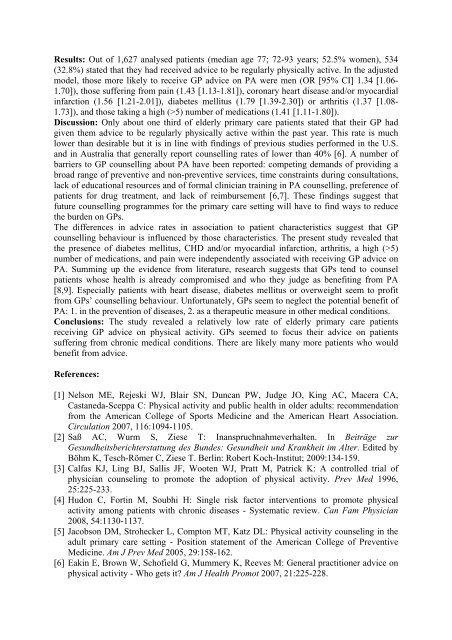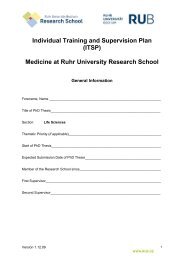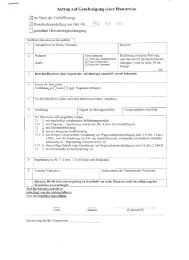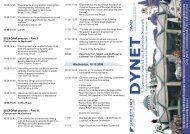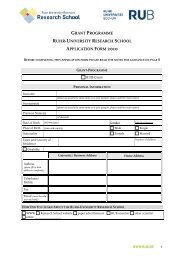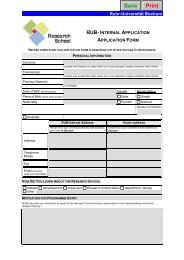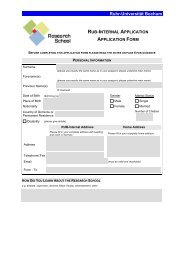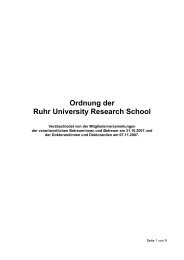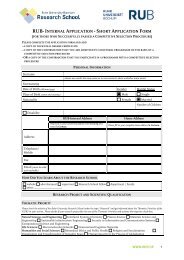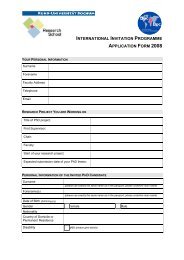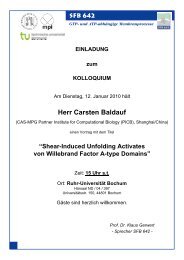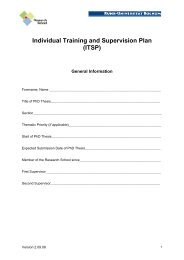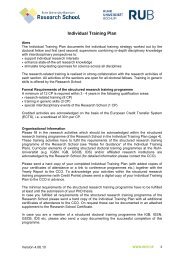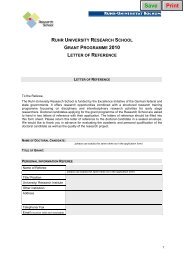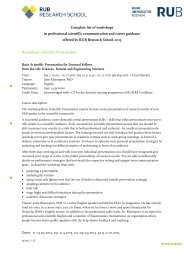Section Days abstract book 2010.indd - RUB Research School ...
Section Days abstract book 2010.indd - RUB Research School ...
Section Days abstract book 2010.indd - RUB Research School ...
You also want an ePaper? Increase the reach of your titles
YUMPU automatically turns print PDFs into web optimized ePapers that Google loves.
Results: Out of 1,627 analysed patients (median age 77; 72-93 years; 52.5% women), 534<br />
(32.8%) stated that they had received advice to be regularly physically active. In the adjusted<br />
model, those more likely to receive GP advice on PA were men (OR [95% CI] 1.34 [1.06-<br />
1.70]), those suffering from pain (1.43 [1.13-1.81]), coronary heart disease and/or myocardial<br />
infarction (1.56 [1.21-2.01]), diabetes mellitus (1.79 [1.39-2.30]) or arthritis (1.37 [1.08-<br />
1.73]), and those taking a high (>5) number of medications (1.41 [1.11-1.80]).<br />
Discussion: Only about one third of elderly primary care patients stated that their GP had<br />
given them advice to be regularly physically active within the past year. This rate is much<br />
lower than desirable but it is in line with findings of previous studies performed in the U.S.<br />
and in Australia that generally report counselling rates of lower than 40% [6]. A number of<br />
barriers to GP counselling about PA have been reported: competing demands of providing a<br />
broad range of preventive and non-preventive services, time constraints during consultations,<br />
lack of educational resources and of formal clinician training in PA counselling, preference of<br />
patients for drug treatment, and lack of reimbursement [6,7]. These findings suggest that<br />
future counselling programmes for the primary care setting will have to find ways to reduce<br />
the burden on GPs.<br />
The differences in advice rates in association to patient characteristics suggest that GP<br />
counselling behaviour is influenced by those characteristics. The present study revealed that<br />
the presence of diabetes mellitus, CHD and/or myocardial infarction, arthritis, a high (>5)<br />
number of medications, and pain were independently associated with receiving GP advice on<br />
PA. Summing up the evidence from literature, research suggests that GPs tend to counsel<br />
patients whose health is already compromised and who they judge as benefiting from PA<br />
[8,9]. Especially patients with heart disease, diabetes mellitus or overweight seem to profit<br />
from GPs’ counselling behaviour. Unfortunately, GPs seem to neglect the potential benefit of<br />
PA: 1. in the prevention of diseases, 2. as a therapeutic measure in other medical conditions.<br />
Conclusions: The study revealed a relatively low rate of elderly primary care patients<br />
receiving GP advice on physical activity. GPs seemed to focus their advice on patients<br />
suffering from chronic medical conditions. There are likely many more patients who would<br />
benefit from advice.<br />
References:<br />
[1] Nelson ME, Rejeski WJ, Blair SN, Duncan PW, Judge JO, King AC, Macera CA,<br />
Castaneda-Sceppa C: Physical activity and public health in older adults: recommendation<br />
from the American College of Sports Medicine and the American Heart Association.<br />
Circulation 2007, 116:1094-1105.<br />
[2] Saß AC, Wurm S, Ziese T: Inanspruchnahmeverhalten. In Beiträge zur<br />
Gesundheitsberichterstattung des Bundes: Gesundheit und Krankheit im Alter. Edited by<br />
Böhm K, Tesch-Römer C, Ziese T. Berlin: Robert Koch-Institut; 2009:134-159.<br />
[3] Calfas KJ, Ling BJ, Sallis JF, Wooten WJ, Pratt M, Patrick K: A controlled trial of<br />
physician counseling to promote the adoption of physical activity. Prev Med 1996,<br />
25:225-233.<br />
[4] Hudon C, Fortin M, Soubhi H: Single risk factor interventions to promote physical<br />
activity among patients with chronic diseases - Systematic review. Can Fam Physician<br />
2008, 54:1130-1137.<br />
[5] Jacobson DM, Strohecker L, Compton MT, Katz DL: Physical activity counseling in the<br />
adult primary care setting - Position statement of the American College of Preventive<br />
Medicine. Am J Prev Med 2005, 29:158-162.<br />
[6] Eakin E, Brown W, Schofield G, Mummery K, Reeves M: General practitioner advice on<br />
physical activity - Who gets it? Am J Health Promot 2007, 21:225-228.


